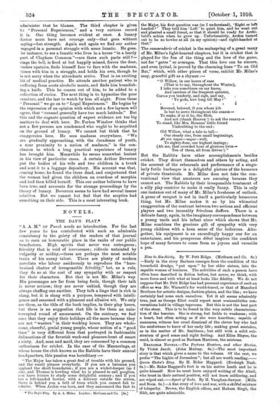Nine to Six-thirty. By W. Pett Ridge. (Methuen and Co.
6s.) —Early in the story Barbara emerges from the condition of the household drudge, "put upon" by her elder sisters, into the capable woman of business. The activities of such a person have often been described in fiction before, but never, we think, with more force and with what at least looks like fidelity. We do not suppose that Mr. Pett Ridge has had personal experience of such an office as was Mr. Warnett's for world-travel, or that of Mansford Brothers for artistic designs, fashion-plates, and the like ; we have certainly had none such ourselves. Yet it all seems admirably true, just as George Eliot could report most oraisernblables con- versations held in village taprooms. But this is not the best part of the story. This is to be found in the very subtle characterisa- tion of the heroine. She is strong, but liable to weakness; with a heart, but often acting as if she were heartless ; capable of meanness, witness her cruel dismissal of the clever boy who had the misfortune to know of her early life ; making great mistakes, as in the matter of Mr. Smithson; but still with a solid sub- stratum of good sense and right feeling. And Ellen Blayes, the maid, is almost as good as Barbara Harrison, the mistress.


























































 Previous page
Previous page